Numéro Cinq has a thing for hybrid art, for cross-genre art, for parody and mixed form, more Menippean satire and art made out of books and in that vein we offer here encaustic paintings by the Boulder, Colorado, artist Marco Montanari along with poems by Elaine Handley from Saratoga Springs, New York. The poems and the paintings combine; the paintings inspired the poems. They are ekphrastic and hybrid. Ekphrasis is the Greek rhetorical device of inserting the description of a work of art into a text as a way of creating meaning (by analogy or parallel). Coincidentally, the standard classical example of ekphrasis is Homer’s description of the shield of Achilles in the Iliad (also Hesiod’s description of the shield of Hercules). It’s a device with an ancient tradition, never abandoned. For example, here’s a stanza from W. H. Auden’s “The Shield of Achilles.”
She looked over his shoulder
…For athletes at their games,
Men and women in a dance
…Moving their sweet limbs
Quick, quick, to music,
…But there on the shining shield
His hands had set no dancing-floor
…But a weed-choked field.
And so it’s delightfully literal that Handley and Montanari have chosen warriors and shields as their central motif, adding to an ancient tradition that in this instance they have reanimated with more recent wars and warriors. Gorgeous, sad, dignified, violent images and words, given yet another twist by the poet’s particularly female point of view.
dg
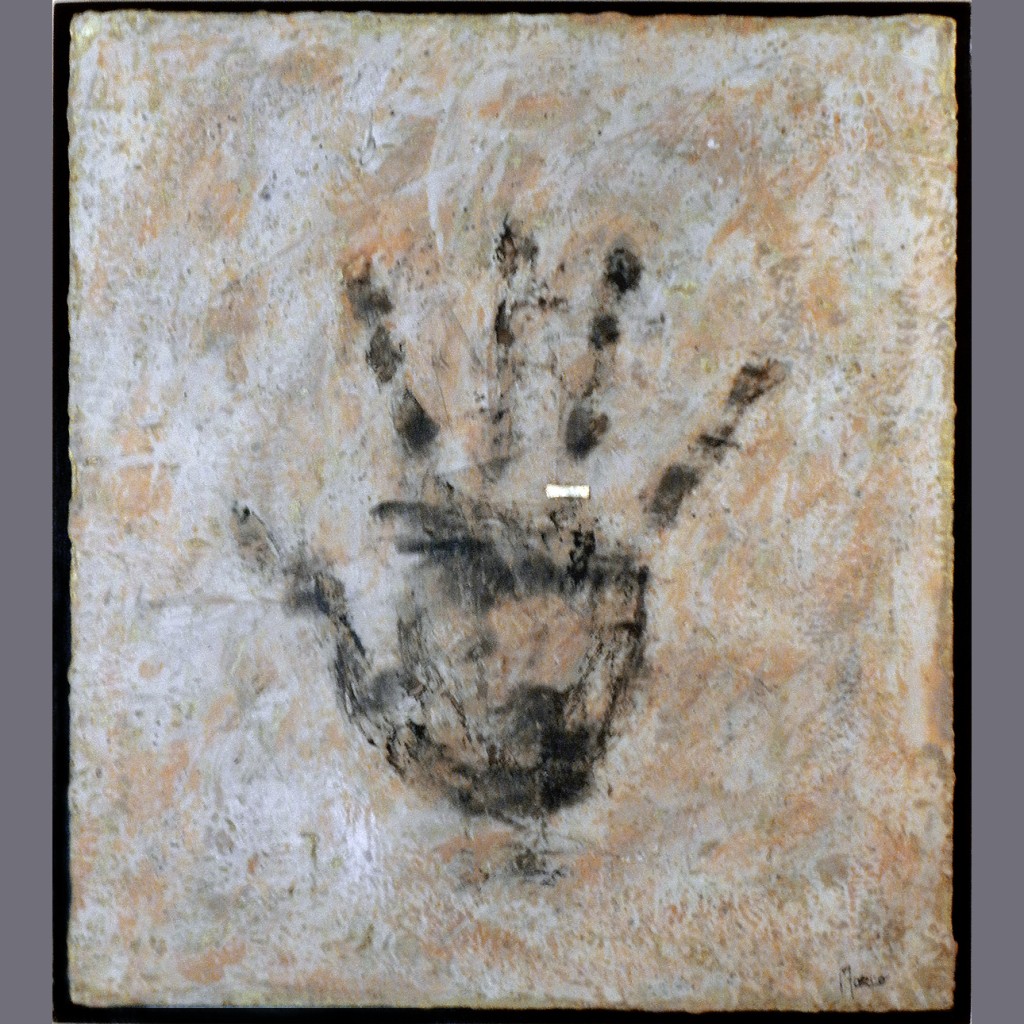 My Father’s Helping Hand – I. Encaustic paint on board with gold, bronze washes and dustings, 21×42 inches, 2013
My Father’s Helping Hand – I. Encaustic paint on board with gold, bronze washes and dustings, 21×42 inches, 2013
Out of Hand
1
Their fluttery needs, their choking
insistence, too powerful for words,
gestures of desire, insatiable.
2
The fingers more nimble than the brain,
they take flight or become nests on a lap:
their instincts all their own
to seize a pen write a poem
cradle an egg pluck a weed
brush back hair stir a cake,
slap a cheek smash a plate
tear a hole poke an eye
mend a sock button a shirt
clutch grab snatch grip
trace the boundaries of a kiss
hang dumbly from the wrists.
3
Like mouths they are always
hungry, and sometimes the palms
are lonely as the sky, fingers as fast
and nervous as moths.
4
Hers
neatly folded, quiet,
like the still wings
of a shot bird.
/
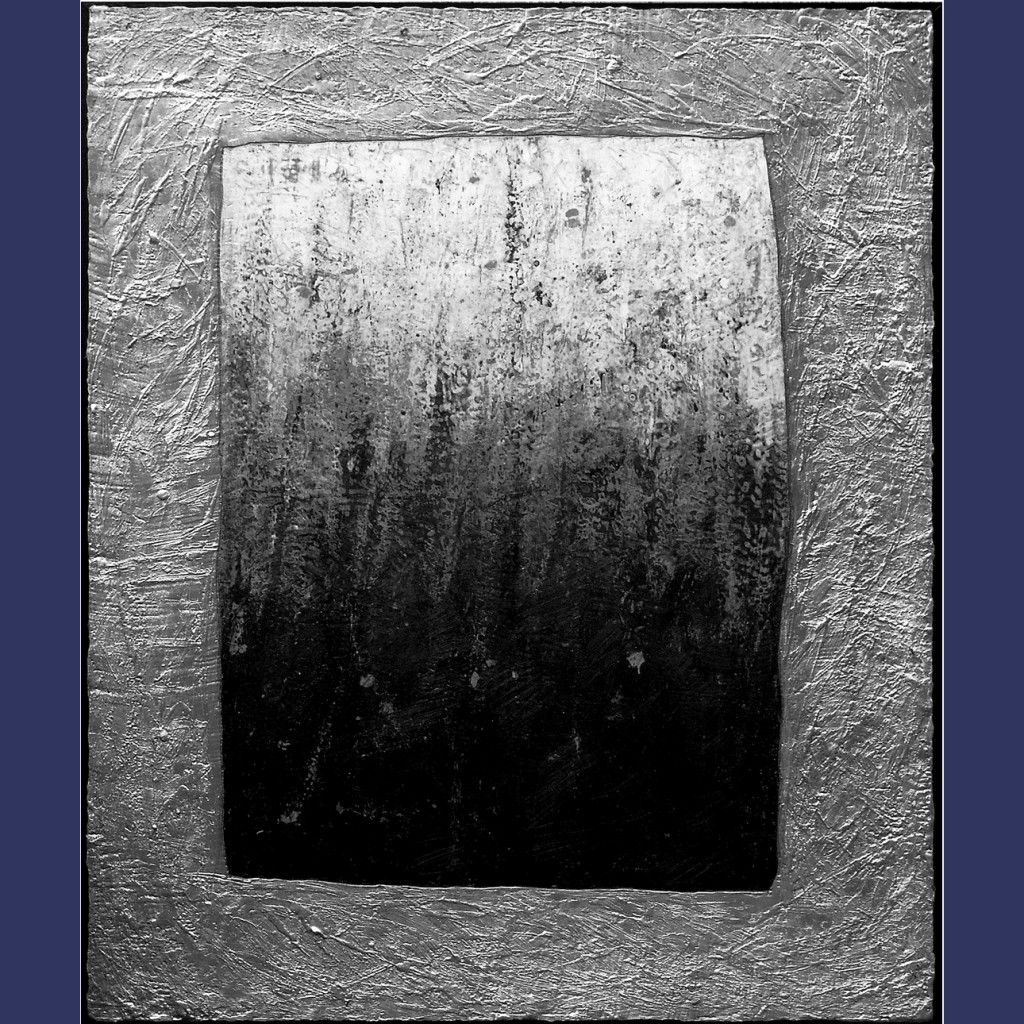 Dark Merging to Light – I. Encaustic paint on board with gold, bronze washes and dustings, 30×36 inches, 2012.
Dark Merging to Light – I. Encaustic paint on board with gold, bronze washes and dustings, 30×36 inches, 2012.
Rapprochment
When war ends ghosts rise up
to blossom white against
the world gone black,
color like hope, bled out.
How can we stand such times
and live? What we have destroyed blinding
as bright snow. Self‐righteousness
hatching into responsibility; guilt
flies around like wild birds.
More hauntings will come from those
who were there, who ate the landscape
and try to live with its poison in their craws.
Like snow, death covers everyone,
everything with its sameness. Grief,
white breath in cold air, last words
and all expectations stilled
with your heartbeat.
But annihilation is another matter.
Can light emanate from darkest deeds
the way opposites love each other:
now we speak of the pearly cell
of peace. The arithmetic
of possibility. Its labyrinth.
War ending:
door closing or opening
darkness light,
the grayness of promise.
/
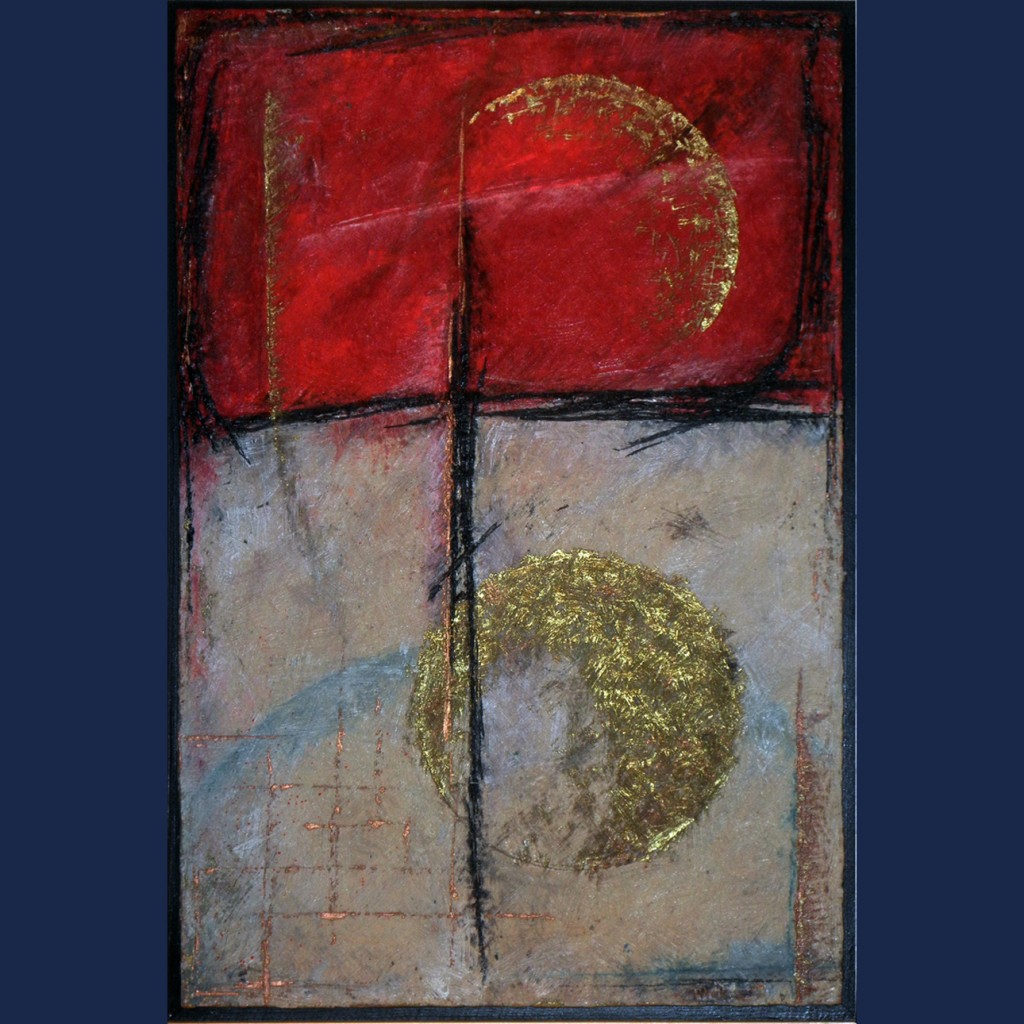 Entering a Contrary Moon – Phase I. Encaustic paint on board with gold, bronze washes and dustings, 17×25 inches, 2011.
Entering a Contrary Moon – Phase I. Encaustic paint on board with gold, bronze washes and dustings, 17×25 inches, 2011.
Entering a Contrary Moon
Enter the contrary moon.
See how it tumbles,
bright scrape in the sky
turning and turning
its measured dervish way.
Its silvered light
milk we drink.
Its circles
what we are made of,
how we live.
To be contrary is to be truest
to ourselves, all clash and remedy:
harlot, saint, demon, beggar.
What you are Sunday is not
what you are Tuesday. Impulses
flick like leaves in wind;
what you see gets clouded
and then emerges
bright and clean again.
Let the moon tumble
in its wanton way
and let us live our contrary lives
confused and laughing
at how we contradict
the alchemy of light and dark,
belief and action, thinking
we confound the ellipse of life,
but we cannot, no more
than the gold stain
of moon can erase
its corona from the sky.
/
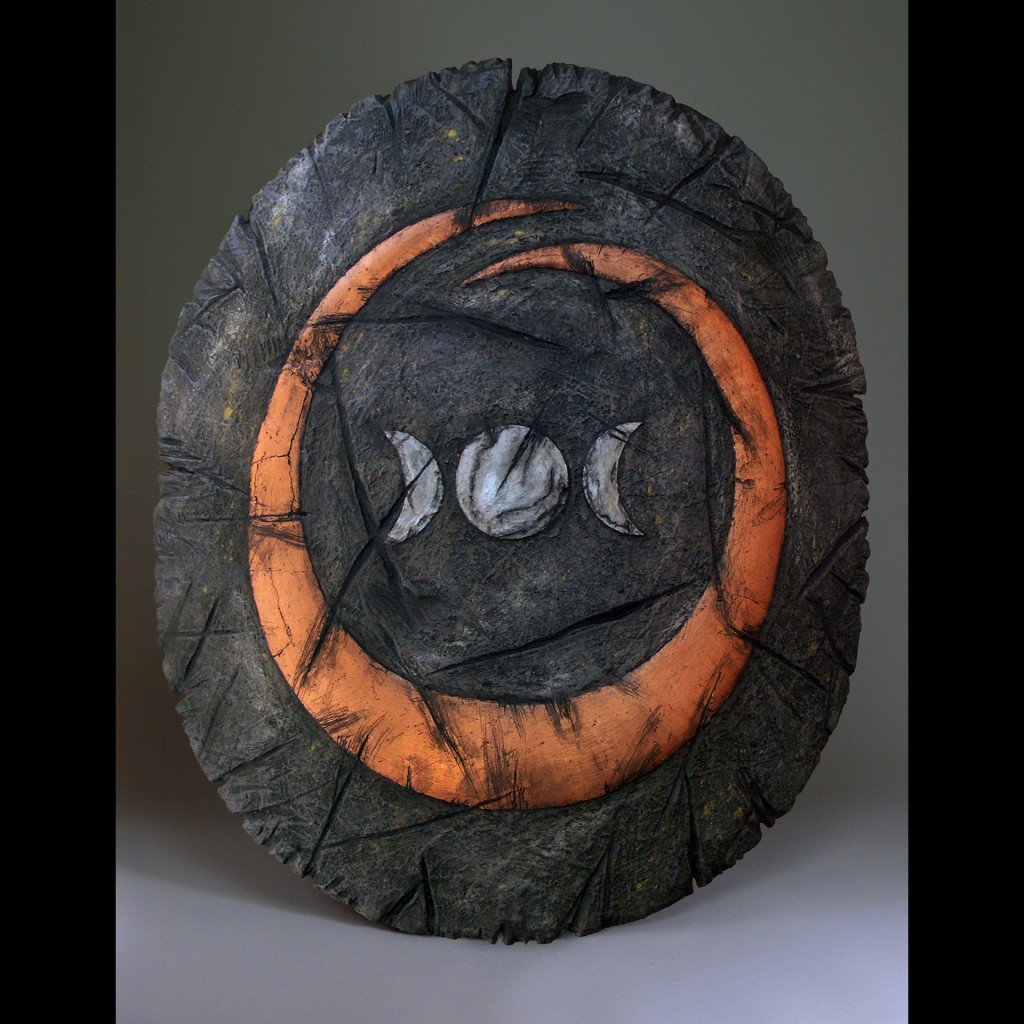 Maiden, Mother, Matriarch of the Spiritual Warrior Woman – I. Encaustic paint on board with gold, bronze washes and dustings, 28×31 inches.
Maiden, Mother, Matriarch of the Spiritual Warrior Woman – I. Encaustic paint on board with gold, bronze washes and dustings, 28×31 inches.
Open Circle
After every war
someone’s got to tidy up.
Things won’t pick
themselves up, after all.
From “The End and The Beginning” by Wislawa Symborska
Women have done it for generations,
for centuries, in fact, throughout all time.
Quietly, they set about making repairs.
First they must solder together
what has been broken
in themselves. Hard to do
and clumsy. Sometimes they give
up and make do. Jagged fragments
float in the bloodstream,
lodging close to the skin.
Next, they have to cauterize time.
When he returns it must be as if
no one has changed, feelings have not
clotted, he is the beloved returning.
She still knows him even though
he is now a stranger.
And so they colonize; it is not
spoken of, this new life
as aliens, exiles living
in the wreckage of the familiar.
He is looking for the secret passage
from war to the present, from war to her.
She sees his shadow from the mouth
of the cave, but to look back means
losing him forever, and who
will she see him with?
It is the bottom of the morning
in their lives, scarred compatriots,
lonelier than they have ever been,
subsisting on memories and dreams
they wrote each other, what fed them before.
She has tried to tidy up, she knows things now
she didn’t know before about cost.
They have children who feel amputated
and are yet whole. They live like ghosts.
The truth is not hers to utter,
but there is no one else to say it.
/
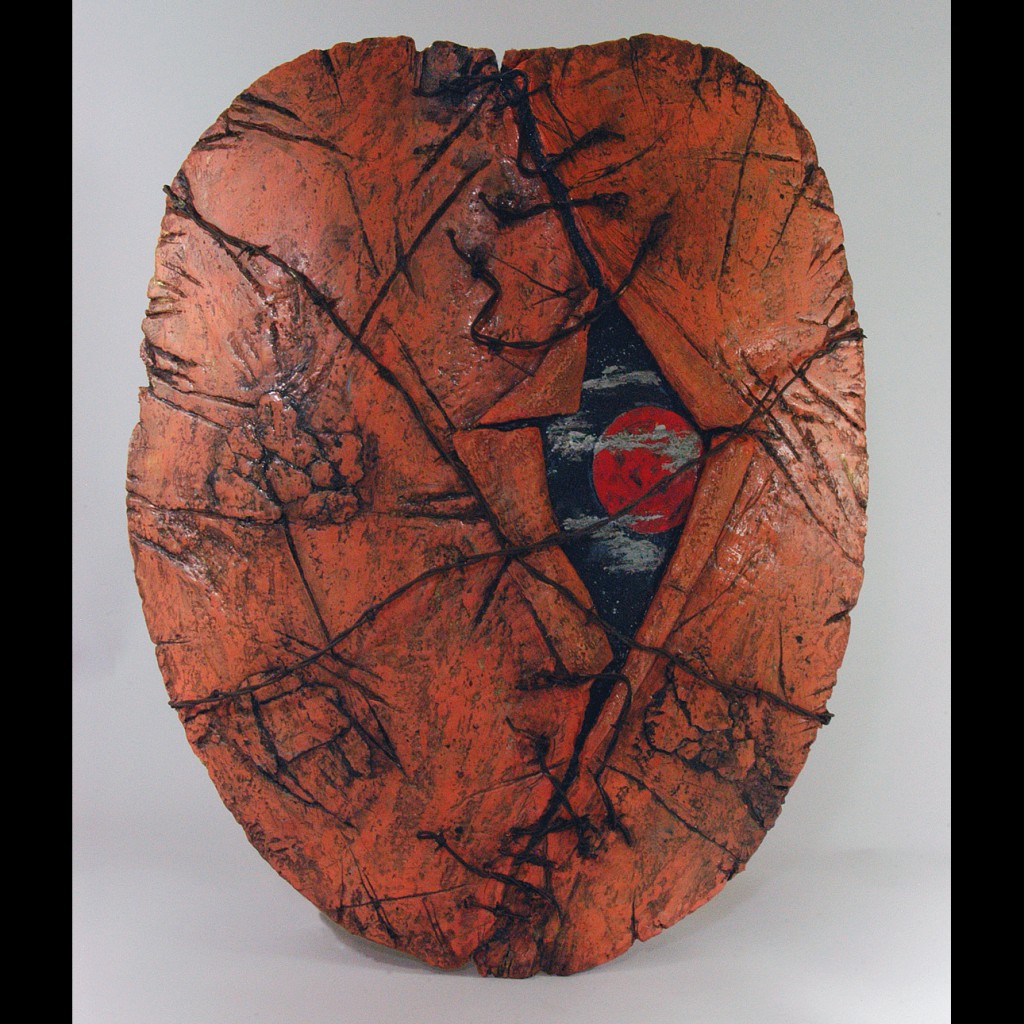 Dismantled to the Blood Moon – I. Encaustic paint on board with gold, bronze washes and dustings, 23×27 inches, 2013.
Dismantled to the Blood Moon – I. Encaustic paint on board with gold, bronze washes and dustings, 23×27 inches, 2013.
Securing the Perimeter
I
Once I loved a man
who secured only
his own perimeter,
heart razor-wired shut
wandering eye on patrol.
I waited for him, hoping to dismantle
what ticked inside him
trying to navigate
the concussion of his moods,
to ignore his dereliction
of duty.
What did I know of war,
but what I tasted
on his lips?
II
If you don’t tell it, maybe you didn’t see it.
If you don’t tell it, maybe you didn’t feel it.
If you don’t tell it, maybe you didn’t do it.
If you don’t tell it, maybe you can forget.
Maybe the war will stop some day
festering in your gut, marching
to the flat knock of your heart.
III
Who counts the bodies
after war is over?
How long does friendly
fire last? Who listens
to children crying in their beds
missing fathers
already home?
IV
He wears memories like skin
so close we are heartbeats
away from the flash.
V
The dead should not sit at table with us;
They have their own places to be.
We might then stop feeding the children
annihilation with every meal. And no, dear, no
wine for me, the color of blood.
VI
He lives in no woman’s land, a boundary
between dying and dying. Between the war
torn raggedness of us now and what we planned.
VII
Were Adam and Eve this lonely?
Did they make love in the light
Of the blood moon?
Did she lie awake listening to
his breathing, patrolling the shadowlands
of his dreams?
Did Adam stalk the perimeter
of the garden while Eve watched,
brushing away the scorpions
crawling toward her
in the unforgiving sun?
—Images by Marco Montanari; Poems by Elaine Handley
SPACE
Born in 1952, Marco Montanari was raised in Buffalo N.Y. His art education includes a minor in Fine Arts at Erie Community College and classes at the State University of N.Y., as well as ongoing study in sculpture, life drawing and painting throughout the years. In 1993, while living in Saratoga Springs N.Y., Marco developed a process of sculpting wax on a wood lathe and then painting the sculpted surfaces with paraffin wax. These sculptures were designed as luminaries with the painted surfaces glowing when lit. In 2000 Marco began to experiment with translating these techniques into encaustic painting. He developed his alternative to traditional encaustic and as a result has produced a distinctive body of work that has been exhibited throughout the country. In 2003 Marco and wife, Kathy Zilbermann, relocated to Boulder Colorado where he is currently working exclusively in encaustic painting.
Elaine Handley is Professor of Writing and Literature at SUNY Empire State College. She has published poetry and fiction in a variety of magazines and anthologies, and has won the Adirondack Center for Writing Best Book of Poetry Award, with writing partners Marilyn McCabe and Mary Sanders Shartle, in 2005 2006 and 2010. Their latest book of poetry Tear of the Clouds was released by Ra Press in 2011. Handley’s most recent chapbook of poetry is Letters to My Migraine and she is completing a novel, Deep River, about race relations during the Civil War.
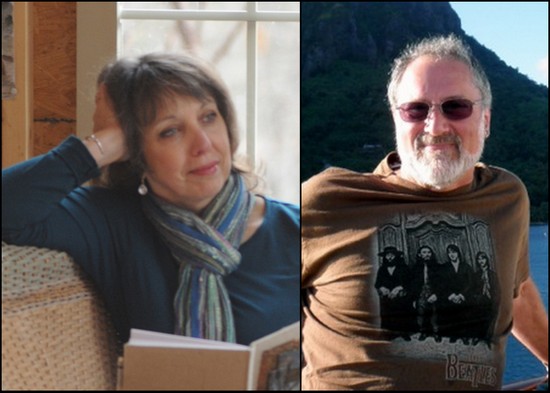
Love the paintings and the poems…I’ve written a number of poems inspired by an artist’s depictions of petroglyphs and can get lost in the world of this type of translation…got the idea after reading the Convergence of Birds – writings inspired by Joseph Cornell’s boxes…edited by Jonathon Safron-Foer…highly recommended.